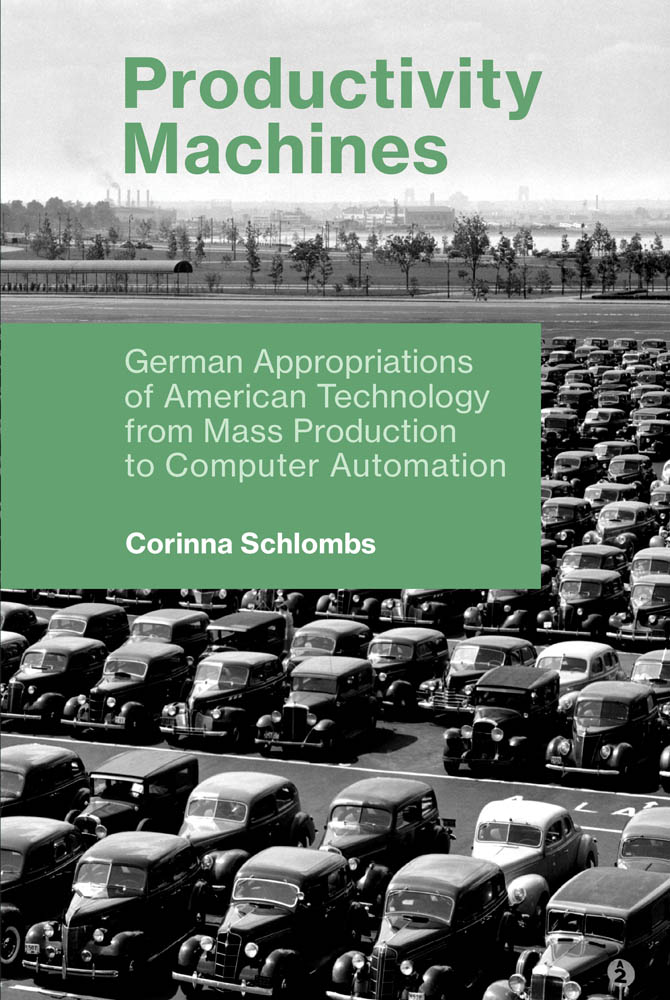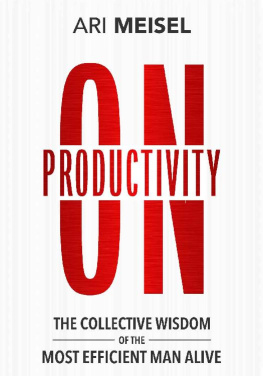
Productivity Machines
History of Computing
William Aspray and Thomas J. Misa, editors
For a complete list of books in the series, please see the back of the book.
Productivity Machines
German Appropriations of American Technology from Mass Production to Computer Automation
Corinna Schlombs
The MIT Press
Cambridge, Massachusetts
London, England
2019 Massachusetts Institute of Technology
All rights reserved. No part of this book may be reproduced in any form by any electronic or mechanical means (including photocopying, recording, or information storage and retrieval) without permission in writing from the publisher.
Library of Congress Cataloging-in-Publication Data
Names: Schlombs, Corinna, author.
Title: Productivity machines : German appropriations of American technology from mass production to computer automation / Corinna Schlombs.
Description: Cambridge, MA : MIT Press, [2019] | Series: History of computing | Includes bibliographical references and index.
Identifiers: LCCN 2018047659 | ISBN 9780262537391 (pbk. : alk. paper)
Subjects: LCSH: Production engineering--Germany--History. | Technology transfer--United States--History. | Industrial productivity--Germany--History. | Technical assistance, American.
Classification: LCC TS73 .S35 2019 | DDC 670--dc23 LC record available at https://lccn.loc.gov/2018047659
10 9 8 7 6 5 4 3 2 1
ISBN: 978-0-262-53739-1
Retail e-ISBN: 978-0-262-35372-4
Library e-ISBN: 978-0-262-35371-7
MITP e-ISBN: 978-0-262-35370-0
d_r0
To my parents, Clara and Paul Schlombs
Contents
Fortunately, books are not measured by the productivity of their authors in words per hour, for I have spent more time researching, contemplating, writing, and revising the words in this book than I care to admit. I would like to thank my advisers, who guided my initial forays into the transatlantic history of computing at the University of Pennsylvania: Ruth Schwartz Cowan, who nudged me into choosing a topic that took advantage of my German background, always encouraged me to do my best, and generously shared professional advice as well as personal concerns; Nathan Ensmenger, who introduced me to the history of computing and was a steadfast supporter with levelheaded advice; Tom Misa, who readily supported me even before he joined my committee as an external adviser, and who has continued to back my work through helpful comments and advice; and Ron Granieri, who joined my committee late to lend his expertise in German history, and who continues to cheer me on. I would also like to thank the faculty and grad students in the History and Sociology of Science Department who created an always intellectually engaging community in a cooperative environment with teatimes (thanks, Jeremy!), journal clubs, and office conversations in which new ideas could be freely tried, critiqued, improved, and if necessary, discarded. I would particularly like to mention my writing groups with Andi Johnson, Emily Pawley, Divya Roy, Hilary Smith, and Dominique Tobbell. Since then, the Rochester Institute of Technology (RIT) has become the institutional home for my work, and my thanks go to dear colleagues in the history department and across our college for their unwavering personal and professional support as well as to our colleges deans for accommodations to balance work and life.
Funding from National Science Foundation Scholars Award #15020127, research awards from the Hagley Library and Museum as well as the Truman Library Institute, and a Paul A. and Francena L. Miller Faculty Fellowship Award and several faculty research grants from my college enabled me to conduct additional archival research, and expand the scope and time frame of my research. I have also received support through a National Science Foundation Dissertation Improvement Grant, a scholar-in-residence fellowship at the Deutsches Museum, the Adelle and Erwin Tomash Fellowship in the History of Information Processing from the Charles Babbage Institute, an IEEE Fellowship in Electrical History, and a dissertation research fellowship from the University of Pennsylvania.
The Tensions of Europe network provided an initial intellectual home for my work, thanks to Gerard Alberts. Many companions in SHOTs special interest groups in computing and gender studies, SIGCIS and WITH, have become colleagues, mentors, and friends over the years, particularly Amy Bix, Nina Lerman, Arwen Mohun, and Erik Rau. Countless commentators and copanelists have provided helpful insights and feedback, and shaped and improved my thoughts on quantification, codetermination, labor, gender, and corporate relations; most prominently among them are Janet Abbate, Keith Breckenridge, Will Chou, Patrick Chung, Jim Cortada, Helena Durnova, Larry Frohman, Shennette Garrett-Scott, Ellen Hartigan-OConnor, Marie Hicks, John Krige, Jan Logemann, Joris Mercelis, Tom Mullaney, Mary Nolan, Jason Parker, Ben Peters, Joy Rohde, Andy Russell, Perrin Selcer, Edie Sparks, Ying Jia Tan, Ksenia Tatarchenko, Steve Usselman, Lee Vinsel, Heidi Voskuhl, Audra Wolf, and Jeff Yost. Eden Medina shared early advice on the book revision process, and Dan Raff compassionately accompanied my professional pursuits. Tamar Carroll, Nathan Ensmenger, Christine Keiner, Emily Pawley, and Rebecca Scales read chapter drafts, and Rena Searle patiently commented on numerous chapter drafts in addition to sharing (busy family) life in Rochester.
My research would not have been possible without the support of many librarians and museum professionals and volunteers. First and foremost, my thanks go to Morna Hilderbrand at RITs interlibrary loan department who obtained countless books from libraries close and far, and who always worked magic when I needed to keep books longer. Id also like to mention the late Fritz Kistermann, a volunteer at the Haus zur Geschichte der IBM Datenverarbeitung, then in Sindelfingen, Germany, who spent three full days with me so that I could investigate IBM employee magazines in the museums holdings; and the late Karl Ganzhorn and two former IBM employees in Germany who shared their time and expertise in oral history interviews. Nelson Lees and his staff at the Center for Economic Initiatives, and many other archivists, responded to inquiries for oral history transcripts, obscure yearbook entries, image permissions, and other requests. The indefatigable Susan Matheson helped clarify my thoughts, and Katie Helke, Virginia Crossman, and the staff at the MIT Press shepherded my project through the publication process, always with timely and invaluable advice.
Productivity Machines has a companion website at https://productivitymachines.com. The website makes available core primary sources, such as US government studies on productivity and automation, reports by German visitors to the United States, documents on management and labor relations in the United States and Germany, and sources on the Marshall Plans Productivity Program. Originating from the National Science Foundations requirement for data management, the site assembles archival sources from the United States and Germany for the benefit of readers as well as teachers and students, in one single, easily accessible place. I would like to thank Mason Lezette and Nick Stanekboth museum studies students at RITfor their excellent work in selecting, organizing, and presenting the website content as well as programming and designing the site (and many fun conversations along the way!), and Frances Andreu, Rebekah Walker, and the staff at RITs Digitization Lab for their professional support.
Next page










